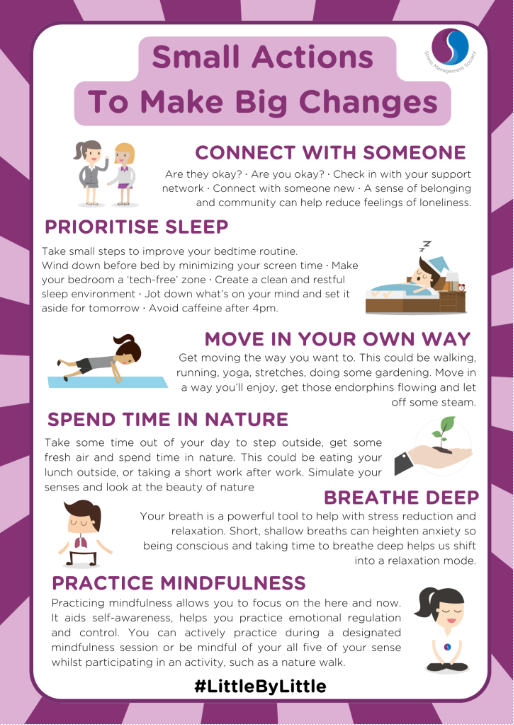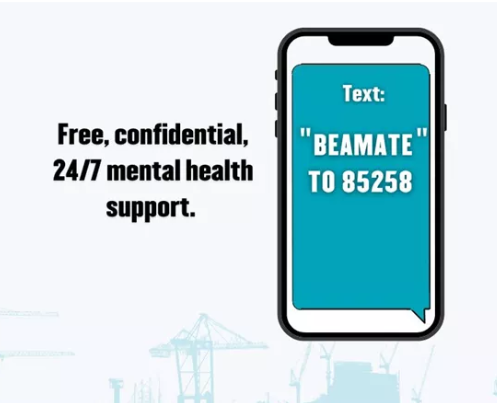April is stress awareness month and this year’s theme is #LittleByLittle. The importance of small but consistent changes in how we manage our lives can’t be underestimated. The Stress Management Society’s research highlights that small steps in self-care and wellbeing routines can develop into significant benefit for ourselves and those we care about. Take a look at the poster below for some ideas.

Stress is something that connects us all and is a response to the demands of life. We all experience it – both positive stress that motivates us and negative stress that causes us distress. How do you experience negative stress? What triggers it? What helps you at these times?
Sadly we know from research undertaken by the Health & Safety Executive that in 2022/2023:
- There were 875,000 cases of work-related stress, depression or anxiety.
- Stress, depression or anxiety accounted for 49% of all work-related ill-health cases and 54% of all working days lost due to work-related ill-health.
- The main work factors cited as causing work-related stress, depression or anxiety include the demands of the job, lack of control, lack of information and support, work relationships, and roles and responsibilities.
Often if we are feeling overwhelmed by stress we can find ourselves in a bit of a spiral of trying to keep going in the presence of the stress and all of its symptoms. Shame or the fear of worrying others can often leave us hoping that at some point the stress will go away if we can just keep going using determination and perseverance. However, this is likely to make things worse for a lot of people and can lead to burnout at work and strains on relationships with those around you. The key to fighting stress is to first know what it looks and feels like for you, then knowing how to step away from stress and give yourself a break and time to recover or reduce the sources of stress in some way.
Try and take control of you. Why don’t you join the 30 day challenge?
Team up with a family member, friend or work colleague to encourage each other to focus on one healthy habit. It takes about 30 days to turn a new behaviour into a habit so choose what you’d like to focus on – perhaps take a digital detox, make a plan to meet up with a friend every week that you’ve been unable to see, keep going with your daily walk.
30-Day-Challenge-Hints-Links-and-Tips-Physical-Mental-Emotional-1.pdf (stress.org.uk)
Discuss coping strategies i.e. practising deep breathing, relaxation or grounding techniques, where you can use all of your senses paying attention to what you can see, touch, hear, smell and taste. Feeling in control of your body, increases your sense of psychological control. We often struggle to have rational thoughts, focus and remember basic things when struggling with negative stress. Any activities where we can be help ourselves focus on one thing at once like mindfulness can really help an over-busy brain. There are many helpful websites and podcasts on mindfulness to try so you can find what works for you. Mindfulness doesn’t have to mean sitting on a yoga cushion cross legged! Find your own way of helping your mind focus on one thing at once and staying in the present moment – it might be running, walking the dog, working in the garden, watching the birds.
Would you like to unlock your happy hormones? Focus on your breath – your body’s first aid tool. The breathing pattern of 4 in through the nose, holding the breath for 4 and breathing out through the mouth to a count of 6 is good enough for the SAS and it’s what we teach our clients. It helps the calming part of our central nervous system get to work and in 2 to 3 minutes lowers our blood pressure.
We all need to help our bodies release our happy hormones. We all know that being outside is a great way of doing this for our body’s vitamin D levels. Serotonin, dopamine, endorphins and oxytocin are our body’s happy cocktail so how do we help release these more?
Serotonin helps stabilise our mood and is increased by being outside in nature, having a massage, breathing exercises.
Dopamine our reward chemical is released by celebrating success, mindfulness and meditation, sunlight, listening to music.
Endorphins are released by laughing, eating cacao rich foods, creative activities and having sex. Finally, oxytocin is released by petting your dog or cat, spending time with friends, yoga and hugs.
Sadly stress doesn’t just impact our mental health and create the risk of anxiety and depression, it is also strongly linked to problems with our immune system, heart disease, sleep and appetite difficulties, stomach and back problems.
Speak up at work for mental health
Whatever type of work you are in there is a forum for you. ‘Mates in Mind’ is a group focused on industry, construction, transport and logistics sectors and has some great hints and tips for getting stress on your organisation’s health and safety agenda. They offer a ‘Mates in Mind’ text service – sometimes we can’t speak so just text “BeAMate” to 85258 and trained volunteers can help with issues including anxiety, stress, loneliness or depression and the service is available 24/7.

Shout is another free, confidential and 24/7 text messaging service for anyone in the UK who needs support.
If you are struggling to cope and need to talk, trained Shout Volunteers are here for you. To start a conversation, text the word ‘Shout’ to 85258.
Your organisation may consider reviewing it’s mental health strategy, increasing awareness training and even appointing mental health first aiders. If you have responsibility for health and safety, please contact us to discuss how we can help put mental health on the map in your business.
However you feel in the coming weeks, reach out and speak to others as you are not alone in this.
Take a look on our website for helpful guidance or contact us for support and advice – email: wellness-consultancy@outlook.com; Website: The Wellness Consultancy
Rachel Wesley
Contact Tel: 07759 516241
Further information:
https://www.stress.org.uk/sam2024/
https://www.matesinmind.org/training-and-resources/stress-awareness-month-april-2024
How we can help | How Samaritans can help you | Samaritans

